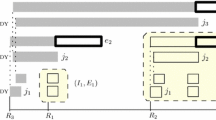Abstract
We consider the problem of nonpreemptively scheduling a set of n jobs with equal processing times on m parallel machines so as to minimize the makespan. Each job has a prespecified set of machines on which it can be processed, called its eligible set. We consider the most general case of machine eligibility constraints as well as special cases of nested and inclusive eligible sets. Both online and offline models are considered. For offline problems we develop optimal algorithms that run in polynomial time, while for online problems we focus on the development of optimal algorithms of a new and more elaborate structure as well as approximation algorithms with good competitive ratios.
Similar content being viewed by others
References
Azar, Y., Naor, J., & Rom, R. (1995). The competitiveness of on-line assignments. Journal of Algorithms, 18, 221–237.
Bar-Noy, A., Freund, A., & Naor, J. (2001). Online load balancing in a hierarchical server topology. SIAM Journal of Computing, 31, 527–549.
Brucker, P., Jurisch, B., & Kramer, A. (1997). Complexity of scheduling problems with multi-purpose machines. Annals of Operations Research, 70, 57–73.
Brucker, P., & Kravchenko, S. A. (2008). Scheduling jobs with equal processing times and time windows on identical parallel machines. Journal of Scheduling, 11, 229–237.
Centeno, G., & Armacost, R. L. (2004). Minimizing makespan on parallel machines with release time and machine eligibility restrictions. International Journal of Production Research, 42, 1243–1256.
Chen, B., Potts, C. N., & Woeginger, G. J. (1998). In D.-Z. Du & P. M. Pardalos (Eds.), Handbook of combinatorial optimization : Vol. 3. A review of machine scheduling: complexity, algorithms and approximability (pp. 21–169). Boston: Kluwer Academic.
Garey, M. R., & Johnson, D. S. (1978). Strong NP-completeness results: Motivation, examples, and implications. Journal of the Association for Computing Machinery, 25, 499–508.
Glass, C. A., & Kellerer, H. (2007). Parallel machine scheduling with job assignment restrictions. Naval Research Logistics, 54, 250–257.
Glass, C. A., & Mills, H. R. (2006). Scheduling unit length jobs with parallel nested machine processing set restrictions. Computers & Operations Research, 33, 620–638.
Hopcroft, J. E., & Karp, R. M. (1973). An O(n 5/2) algorithm for maximum matchings in bipartite graphs. SIAM Journal of Computing, 2, 225–231.
Huo, Y., & Leung, J. Y.-T. (2010). Parallel machine scheduling with nested processing set restrictions. European Journal of Operational Research, 204, 229–236.
Hwang, H.-C., Chang, S. Y., & Lee, K. (2004). Parallel machine scheduling under a grade of service provision. Computers & Operations Research, 31, 2055–2061.
Kravchenko, S. A., & Werner, F. (2009). On a parallel machine scheduling problem with equal processing times. Discrete Applied Mathematics, 157, 848–852.
Lenstra, J. K., Shmoys, D. B., & Tardos, E. (1990). Approximation algorithms for scheduling unrelated parallel machines. Mathematical Programming, 46, 259–271.
Leung, J. Y.-T., & Li, C.-L. (2008). Scheduling with processing set restrictions: a survey. International Journal of Production Economics, 116, 251–262.
Lin, Y., & Li, W. (2004). Parallel machine scheduling of machine-dependent jobs with unit-length. European Journal of Operational Research, 156, 261–266.
Li, C.-L. (2006). Scheduling unit-length jobs with machine eligibility restrictions. European Journal of Operational Research, 174, 1325–1328.
Ou, J., Leung, J. Y.-T., & Li, C.-L. (2008). Scheduling parallel machines with inclusive processing set restrictions. Naval Research Logistics, 55, 328–338.
Pinedo, M. L. (1995). Scheduling—theory, algorithms and systems. New York: Prentice Hall.
Shchepin, E. V., & Vakhania, N. (2005). An optima rounding gives a better approximation for scheduling unrelated machines. Operations Research Letters, 33, 127–133.
Simons, B. (1983). Multiprocessor scheduling of unit-time jobs with arbitrary release times and deadlines. SIAM Journal of Computing, 12, 294–299.
Author information
Authors and Affiliations
Corresponding author
Additional information
K. Lee’s work supported by the Korea Research Foundation Grant KRF-2007-357-D00270.
J.Y.-T. Leung’s work supported in part by NSF Grant DMI-0556010.
M.L. Pinedo’s work supported in part by NSF Grant DMI-0555999.
Rights and permissions
About this article
Cite this article
Lee, K., Leung, J.YT. & Pinedo, M.L. Scheduling jobs with equal processing times subject to machine eligibility constraints. J Sched 14, 27–38 (2011). https://doi.org/10.1007/s10951-010-0190-0
Published:
Issue Date:
DOI: https://doi.org/10.1007/s10951-010-0190-0




